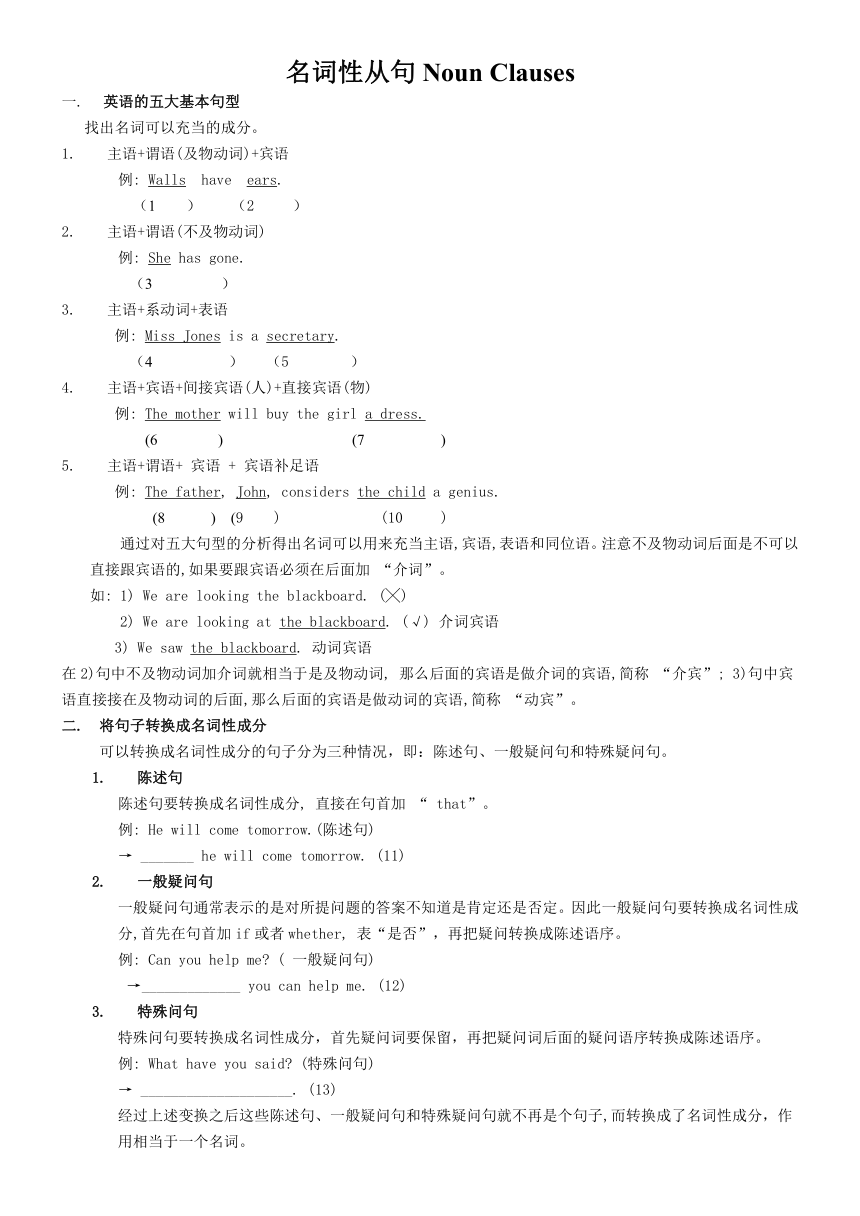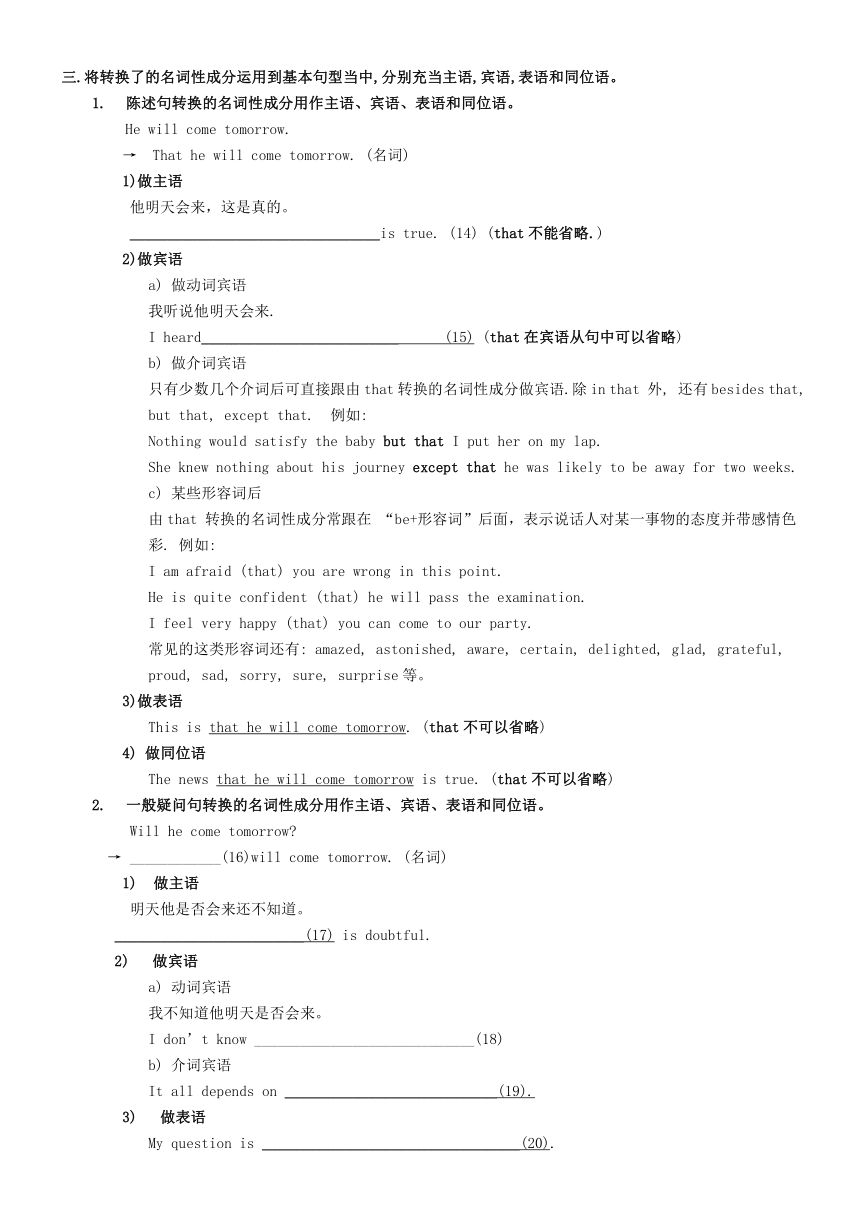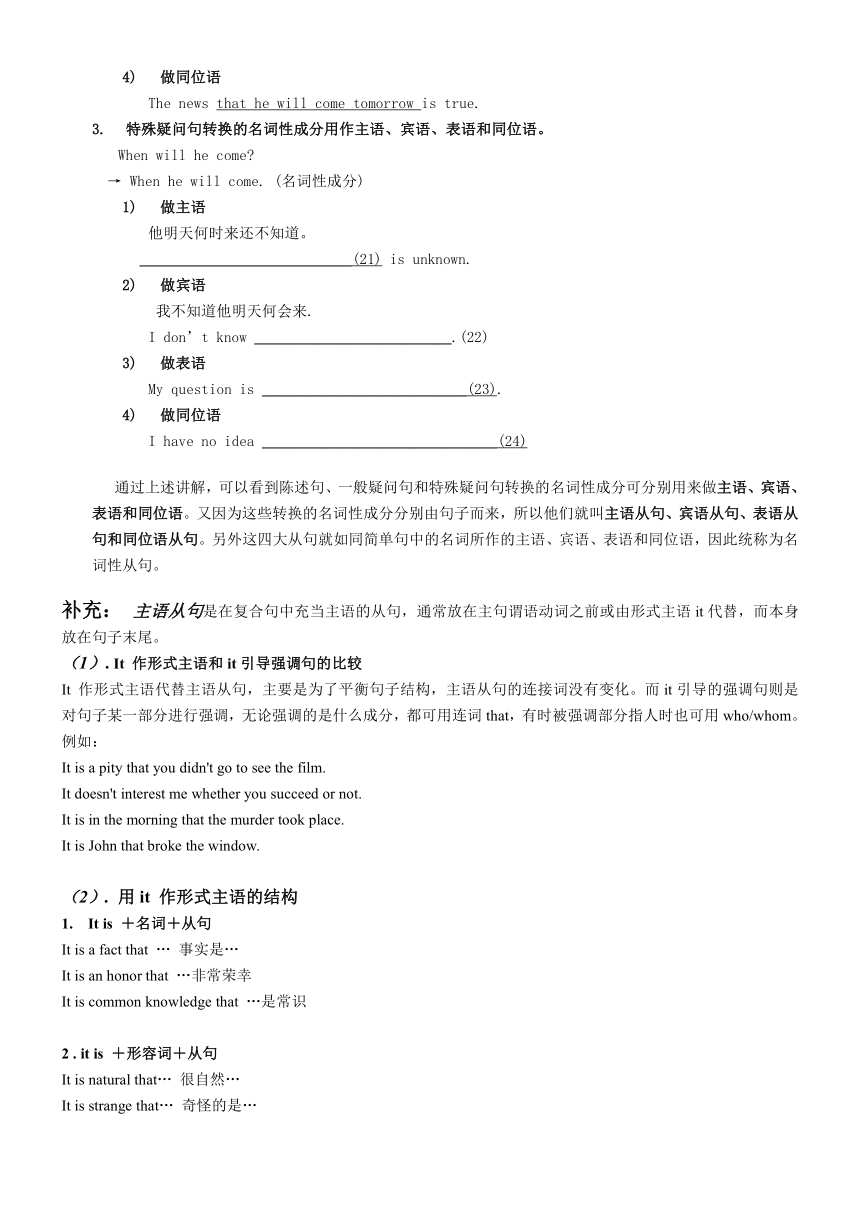名词性从句的讲解及练习
图片预览



文档简介
名词性从句Noun Clauses
一. 英语的五大基本句型
找出名词可以充当的成分。
1. 主语+谓语(及物动词)+宾语
例: Walls have ears.
(1 ) (2 )
2. 主语+谓语(不及物动词)
例: She has gone.
(3 )
3. 主语+系动词+表语
例: Miss Jones is a secretary.
(4 ) (5 )
4. 主语+宾语+间接宾语(人)+直接宾语(物)
例: The mother will buy the girl a dress.
(6 ) (7 )
5. 主语+谓语+ 宾语 + 宾语补足语
例: The father, John, considers the child a genius.
(8 ) (9 ) (10 )
通过对五大句型的分析得出名词可以用来充当主语,宾语,表语和同位语。注意不及物动词后面是不可以直接跟宾语的,如果要跟宾语必须在后面加 “介词”。
如: 1) We are looking the blackboard. (╳)
2) We are looking at the blackboard. (√) 介词宾语
3) We saw the blackboard. 动词宾语
在2)句中不及物动词加介词就相当于是及物动词, 那么后面的宾语是做介词的宾语,简称 “介宾”; 3)句中宾语直接接在及物动词的后面,那么后面的宾语是做动词的宾语,简称 “动宾”。
二. 将句子转换成名词性成分
可以转换成名词性成分的句子分为三种情况,即:陈述句、一般疑问句和特殊疑问句。
1. 陈述句
陈述句要转换成名词性成分, 直接在句首加 “ that”。
例: He will come tomorrow.(陈述句)
→ _______ he will come tomorrow. (11)
2. 一般疑问句
一般疑问句通常表示的是对所提问题的答案不知道是肯定还是否定。因此一般疑问句要转换成名词性成分,首先在句首加if或者whether, 表“是否”,再把疑问转换成陈述语序。
例: Can you help me ( 一般疑问句)
→_____________ you can help me. (12)
3. 特殊问句
特殊问句要转换成名词性成分,首先疑问词要保留,再把疑问词后面的疑问语序转换成陈述语序。
例: What have you said (特殊问句)
→ ____________________. (13)
经过上述变换之后这些陈述句、一般疑问句和特殊疑问句就不再是个句子,而转换成了名词性成分,作用相当于一个名词。
三.将转换了的名词性成分运用到基本句型当中,分别充当主语,宾语,表语和同位语。
1. 陈述句转换的名词性成分用作主语、宾语、表语和同位语。
He will come tomorrow.
→ That he will come tomorrow. (名词)
1)做主语
他明天会来,这是真的。
_________________________________is true. (14) (that不能省略.)
2)做宾语
a) 做动词宾语
我听说他明天会来.
I heard__________________________ (15) (that在宾语从句中可以省略)
b) 做介词宾语
只有少数几个介词后可直接跟由that转换的名词性成分做宾语.除in that 外, 还有besides that, but that, except that. 例如:
Nothing would satisfy the baby but that I put her on my lap.
She knew nothing about his journey except that he was likely to be away for two weeks.
c) 某些形容词后
由that 转换的名词性成分常跟在 “be+形容词”后面,表示说话人对某一事物的态度并带感彩. 例如:
I am afraid (that) you are wrong in this point.
He is quite confident (that) he will pass the examination.
I feel very happy (that) you can come to our party.
常见的这类形容词还有: amazed, astonished, aware, certain, delighted, glad, grateful, proud, sad, sorry, sure, surprise等。
3)做表语
This is that he will come tomorrow. (that不可以省略)
4) 做同位语
The news that he will come tomorrow is true. (that不可以省略)
2. 一般疑问句转换的名词性成分用作主语、宾语、表语和同位语。
Will he come tomorrow
→ ____________(16)will come tomorrow. (名词)
1) 做主语
明天他是否会来还不知道。
_________________________(17) is doubtful.
2) 做宾语
a) 动词宾语
我不知道他明天是否会来。
I don’t know _____________________________(18)
b) 介词宾语
It all depends on ____________________________(19).
3) 做表语
My question is __________________________________(20).
4) 做同位语
The news that he will come tomorrow is true.
3. 特殊疑问句转换的名词性成分用作主语、宾语、表语和同位语。
When will he come
→ When he will come. (名词性成分)
1) 做主语
他明天何时来还不知道。
____________________________(21) is unknown.
2) 做宾语
我不知道他明天何会来.
I don’t know __________________________.(22)
3) 做表语
My question is ___________________________(23).
4) 做同位语
I have no idea _______________________________(24)
通过上述讲解,可以看到陈述句、一般疑问句和特殊疑问句转换的名词性成分可分别用来做主语、宾语、表语和同位语。又因为这些转换的名词性成分分别由句子而来,所以他们就叫主语从句、宾语从句、表语从句和同位语从句。另外这四大从句就如同简单句中的名词所作的主语、宾语、表语和同位语,因此统称为名词性从句。
补充: 主语从句是在复合句中充当主语的从句,通常放在主句谓语动词之前或由形式主语it代替,而本身放在句子末尾。
(1). It 作形式主语和it引导强调句的比较
It 作形式主语代替主语从句,主要是为了平衡句子结构,主语从句的连接词没有变化。而it引导的强调句则是对句子某一部分进行强调,无论强调的是什么成分,都可用连词that,有时被强调部分指人时也可用who/whom。例如:
It is a pity that you didn't go to see the film.
It doesn't interest me whether you succeed or not.
It is in the morning that the murder took place.
It is John that broke the window.
(2). 用it 作形式主语的结构
1. It is +名词+从句
It is a fact that … 事实是…
It is an honor that …非常荣幸
It is common knowledge that …是常识
2 . it is +形容词+从句
It is natural that… 很自然…
It is strange that… 奇怪的是…
3. it is +不及物动词+从句
It seems that… 似乎…
It happened that… 碰巧…
4. it +过去分词+从句
It is reported that… 据报道…
It has been proved that… 已证实…
(3). 主语从句不可位于句首的情况
(1) It is said , (reported) …结构中的主语从句不可提前。例如:
It is said that President Jingo will visit our school next week. (right)
That President Jiang will visit our school next week is said. (wrong)
(2) It happens…, It occurs… 结构中的主语从句不可提前。例如:
It occurred to him that he failed in the examination. (right)
That he failed in the examination occurred to him. (wrong)
(3) It doesn't matter how/whether …结构中的主语从句不可提前。例如:
It doesn't matter whether he is wrong or not. (right)
Whether he is wrong or not doesn't matter. (wrong)
(4) 含主语从句的复合句是疑问句时,主语从句不可提前。例如:
Is it likely that it will rain in the evening (right)
Is that will rain in the evening likely (wrong)
二、名词性从句连接词的选用
(1)that 和what 的选用
that 和 what 都可引导所有的名词从句。但是,what除起连接作用外,还在名词性从句中充当成分,可做从句的主语、宾语、或表语。而that在名词性从句中不充当任何成分,只起连接作用。
Exercise 1 用that / what填空
1.______ he wants is a book.
2. ______ he wants to go there is obvious.
3.The result is ______ we won the game.
4.This is _____ we want to know.
5.Is _____ he told us true
6.We should pay attention to ______ the teacher is saying.
7. I have no doubt _____ he will come.
8. I have no idea _____ he did that afternoon
(2) if 和whether 的选用
不能使用if 的情况:
a. 引导主语从句,表语从句,同位语从句
b. 介词后的宾语从句
c. whether to do 做动词宾语不能用if to do.
d .whether or not 连在一起引导宾语从句时不用if.
e.在句首
Exercise 2
用if / whether填空
1. I asked her __________ she had a bike.
2.______ we will hold a party in the open air tomorrow depends on the weather.
3. We’re worried about ________ he is safe.
4. I don’t know ___________ he is well or not.
5. I don’t know ________ or not he is well.
6. The question is _________ he should do it.
7.The doctor can hardly answer the question ______ the old man will recover soon.
8. I don’t know _______ to go.
(3)引导词that 的省略
单个宾语从句中的that可省略
that不可省略的情况:
a. 主语从句,表语从句,同位语从句
b.用it做形式宾语的宾语从句
c. 并列的宾语从句中的后几个从句的引导词that 不能省略
Exercise 3
用that/ (that)填空
1.I don’t think ________ she is coming.
2.It is a pity ________ he has made such a mistake.
3.The reason is _________ he is careless .
4.The news ________ our team won the match
inspired us.
5.I don’t think it necessary _________ you should
read English aloud.
6.He told me __________ his father had died and __________ he had to make a living alone.
(3)其它连接代词和副词的连用
主要根据名词性从句中的具体意义,正确的选择who、which、when、where、why、
how 等连接词,这些连接词既具有疑问含义,又起连接作用,同时在从句中充当各种成分。
Exercise 3
(1)我们何时举行运动会还没有决定。
________ we shall hold our sports meeting is not decided.
(2)我不知道昨天谁打破了玻璃。
I don’t know _________ broke the glass yesterday.
(3)我不知道他长的什么样子。
I have no idea _________ he looks like.
(4)这就是我忘记眼镜的地方。
This is _________ I left my glasses.
Exercise 4
(1) what 类词(who/ which/ whom/ when/ where/ how): 有疑问意义,表示特指概念, 充当成分。
(2) whatever类词 (whoever/ whichever/ whomever/ whenever/ wherever): 有意义,“凡是… 的,无论…的,所有…的”),无疑问意义,表示泛指概念;充当成分。相当于anyone who, anything that, any one that/ who, any time when, any place where.
改错::
1.Whoever will speak at the meeting has not been decided yet.
2. Who breaks the law shall be punished.
3. Go and find out whatever the child wants.
4. He will give his daughter what she wants.
(4) 同位语从句的引导和辨别
1.同位语从句的格式:n.+ 连接词 + 从句
2.能接同位语从句的名词有:fact、idea, news, information, order, belief, suggestion, advice等
3.连接词通常是that,也可根据含义选用 whether, what, when, where 等来引导同位语从句。
Exercise 5 用that/ whether / where/ how填空
I I have no idea _________ he comes from.
2. He can’t answer the question ________ he got the money.
3.He gave us many suggestions ________ we should get up earlier and take more exercise.
4.I have no doubt ________ he will win.
5. I have some doubt ________ he will win.
Exercise6完成句子
1. 问题是谁能赚到那么多的钱。
The problem is ______ can ________so much money.
2.他想要的东西就是一辆奔驰。
____________________________is a Benz
3. 这家超市里商品丰富,你想买什么就买什么。
There are a variety of goods in this supermarket, so you can buy____________________________ buy.
4. 无论谁上课来晚了都将受到惩罚。
___________________ for class will be punished.
5.很显然,他已经走了。
It’s clear _________________________
6.问题是我什么时候可以离开。
The question is________________________
7. 我不知道他是谁。
______________________________________________________
8.地球是圆的,这是一个事实。
___________________________________________________________________
9. 他是否会来还没定下来。
_________________________ or not hasn’t been decided.
10.我们何时出发还不清楚。
(1)._______________________________ not clear.
(2)____________ _clear ________________________________
一. 英语的五大基本句型
找出名词可以充当的成分。
1. 主语+谓语(及物动词)+宾语
例: Walls have ears.
(1 ) (2 )
2. 主语+谓语(不及物动词)
例: She has gone.
(3 )
3. 主语+系动词+表语
例: Miss Jones is a secretary.
(4 ) (5 )
4. 主语+宾语+间接宾语(人)+直接宾语(物)
例: The mother will buy the girl a dress.
(6 ) (7 )
5. 主语+谓语+ 宾语 + 宾语补足语
例: The father, John, considers the child a genius.
(8 ) (9 ) (10 )
通过对五大句型的分析得出名词可以用来充当主语,宾语,表语和同位语。注意不及物动词后面是不可以直接跟宾语的,如果要跟宾语必须在后面加 “介词”。
如: 1) We are looking the blackboard. (╳)
2) We are looking at the blackboard. (√) 介词宾语
3) We saw the blackboard. 动词宾语
在2)句中不及物动词加介词就相当于是及物动词, 那么后面的宾语是做介词的宾语,简称 “介宾”; 3)句中宾语直接接在及物动词的后面,那么后面的宾语是做动词的宾语,简称 “动宾”。
二. 将句子转换成名词性成分
可以转换成名词性成分的句子分为三种情况,即:陈述句、一般疑问句和特殊疑问句。
1. 陈述句
陈述句要转换成名词性成分, 直接在句首加 “ that”。
例: He will come tomorrow.(陈述句)
→ _______ he will come tomorrow. (11)
2. 一般疑问句
一般疑问句通常表示的是对所提问题的答案不知道是肯定还是否定。因此一般疑问句要转换成名词性成分,首先在句首加if或者whether, 表“是否”,再把疑问转换成陈述语序。
例: Can you help me ( 一般疑问句)
→_____________ you can help me. (12)
3. 特殊问句
特殊问句要转换成名词性成分,首先疑问词要保留,再把疑问词后面的疑问语序转换成陈述语序。
例: What have you said (特殊问句)
→ ____________________. (13)
经过上述变换之后这些陈述句、一般疑问句和特殊疑问句就不再是个句子,而转换成了名词性成分,作用相当于一个名词。
三.将转换了的名词性成分运用到基本句型当中,分别充当主语,宾语,表语和同位语。
1. 陈述句转换的名词性成分用作主语、宾语、表语和同位语。
He will come tomorrow.
→ That he will come tomorrow. (名词)
1)做主语
他明天会来,这是真的。
_________________________________is true. (14) (that不能省略.)
2)做宾语
a) 做动词宾语
我听说他明天会来.
I heard__________________________ (15) (that在宾语从句中可以省略)
b) 做介词宾语
只有少数几个介词后可直接跟由that转换的名词性成分做宾语.除in that 外, 还有besides that, but that, except that. 例如:
Nothing would satisfy the baby but that I put her on my lap.
She knew nothing about his journey except that he was likely to be away for two weeks.
c) 某些形容词后
由that 转换的名词性成分常跟在 “be+形容词”后面,表示说话人对某一事物的态度并带感彩. 例如:
I am afraid (that) you are wrong in this point.
He is quite confident (that) he will pass the examination.
I feel very happy (that) you can come to our party.
常见的这类形容词还有: amazed, astonished, aware, certain, delighted, glad, grateful, proud, sad, sorry, sure, surprise等。
3)做表语
This is that he will come tomorrow. (that不可以省略)
4) 做同位语
The news that he will come tomorrow is true. (that不可以省略)
2. 一般疑问句转换的名词性成分用作主语、宾语、表语和同位语。
Will he come tomorrow
→ ____________(16)will come tomorrow. (名词)
1) 做主语
明天他是否会来还不知道。
_________________________(17) is doubtful.
2) 做宾语
a) 动词宾语
我不知道他明天是否会来。
I don’t know _____________________________(18)
b) 介词宾语
It all depends on ____________________________(19).
3) 做表语
My question is __________________________________(20).
4) 做同位语
The news that he will come tomorrow is true.
3. 特殊疑问句转换的名词性成分用作主语、宾语、表语和同位语。
When will he come
→ When he will come. (名词性成分)
1) 做主语
他明天何时来还不知道。
____________________________(21) is unknown.
2) 做宾语
我不知道他明天何会来.
I don’t know __________________________.(22)
3) 做表语
My question is ___________________________(23).
4) 做同位语
I have no idea _______________________________(24)
通过上述讲解,可以看到陈述句、一般疑问句和特殊疑问句转换的名词性成分可分别用来做主语、宾语、表语和同位语。又因为这些转换的名词性成分分别由句子而来,所以他们就叫主语从句、宾语从句、表语从句和同位语从句。另外这四大从句就如同简单句中的名词所作的主语、宾语、表语和同位语,因此统称为名词性从句。
补充: 主语从句是在复合句中充当主语的从句,通常放在主句谓语动词之前或由形式主语it代替,而本身放在句子末尾。
(1). It 作形式主语和it引导强调句的比较
It 作形式主语代替主语从句,主要是为了平衡句子结构,主语从句的连接词没有变化。而it引导的强调句则是对句子某一部分进行强调,无论强调的是什么成分,都可用连词that,有时被强调部分指人时也可用who/whom。例如:
It is a pity that you didn't go to see the film.
It doesn't interest me whether you succeed or not.
It is in the morning that the murder took place.
It is John that broke the window.
(2). 用it 作形式主语的结构
1. It is +名词+从句
It is a fact that … 事实是…
It is an honor that …非常荣幸
It is common knowledge that …是常识
2 . it is +形容词+从句
It is natural that… 很自然…
It is strange that… 奇怪的是…
3. it is +不及物动词+从句
It seems that… 似乎…
It happened that… 碰巧…
4. it +过去分词+从句
It is reported that… 据报道…
It has been proved that… 已证实…
(3). 主语从句不可位于句首的情况
(1) It is said , (reported) …结构中的主语从句不可提前。例如:
It is said that President Jingo will visit our school next week. (right)
That President Jiang will visit our school next week is said. (wrong)
(2) It happens…, It occurs… 结构中的主语从句不可提前。例如:
It occurred to him that he failed in the examination. (right)
That he failed in the examination occurred to him. (wrong)
(3) It doesn't matter how/whether …结构中的主语从句不可提前。例如:
It doesn't matter whether he is wrong or not. (right)
Whether he is wrong or not doesn't matter. (wrong)
(4) 含主语从句的复合句是疑问句时,主语从句不可提前。例如:
Is it likely that it will rain in the evening (right)
Is that will rain in the evening likely (wrong)
二、名词性从句连接词的选用
(1)that 和what 的选用
that 和 what 都可引导所有的名词从句。但是,what除起连接作用外,还在名词性从句中充当成分,可做从句的主语、宾语、或表语。而that在名词性从句中不充当任何成分,只起连接作用。
Exercise 1 用that / what填空
1.______ he wants is a book.
2. ______ he wants to go there is obvious.
3.The result is ______ we won the game.
4.This is _____ we want to know.
5.Is _____ he told us true
6.We should pay attention to ______ the teacher is saying.
7. I have no doubt _____ he will come.
8. I have no idea _____ he did that afternoon
(2) if 和whether 的选用
不能使用if 的情况:
a. 引导主语从句,表语从句,同位语从句
b. 介词后的宾语从句
c. whether to do 做动词宾语不能用if to do.
d .whether or not 连在一起引导宾语从句时不用if.
e.在句首
Exercise 2
用if / whether填空
1. I asked her __________ she had a bike.
2.______ we will hold a party in the open air tomorrow depends on the weather.
3. We’re worried about ________ he is safe.
4. I don’t know ___________ he is well or not.
5. I don’t know ________ or not he is well.
6. The question is _________ he should do it.
7.The doctor can hardly answer the question ______ the old man will recover soon.
8. I don’t know _______ to go.
(3)引导词that 的省略
单个宾语从句中的that可省略
that不可省略的情况:
a. 主语从句,表语从句,同位语从句
b.用it做形式宾语的宾语从句
c. 并列的宾语从句中的后几个从句的引导词that 不能省略
Exercise 3
用that/ (that)填空
1.I don’t think ________ she is coming.
2.It is a pity ________ he has made such a mistake.
3.The reason is _________ he is careless .
4.The news ________ our team won the match
inspired us.
5.I don’t think it necessary _________ you should
read English aloud.
6.He told me __________ his father had died and __________ he had to make a living alone.
(3)其它连接代词和副词的连用
主要根据名词性从句中的具体意义,正确的选择who、which、when、where、why、
how 等连接词,这些连接词既具有疑问含义,又起连接作用,同时在从句中充当各种成分。
Exercise 3
(1)我们何时举行运动会还没有决定。
________ we shall hold our sports meeting is not decided.
(2)我不知道昨天谁打破了玻璃。
I don’t know _________ broke the glass yesterday.
(3)我不知道他长的什么样子。
I have no idea _________ he looks like.
(4)这就是我忘记眼镜的地方。
This is _________ I left my glasses.
Exercise 4
(1) what 类词(who/ which/ whom/ when/ where/ how): 有疑问意义,表示特指概念, 充当成分。
(2) whatever类词 (whoever/ whichever/ whomever/ whenever/ wherever): 有意义,“凡是… 的,无论…的,所有…的”),无疑问意义,表示泛指概念;充当成分。相当于anyone who, anything that, any one that/ who, any time when, any place where.
改错::
1.Whoever will speak at the meeting has not been decided yet.
2. Who breaks the law shall be punished.
3. Go and find out whatever the child wants.
4. He will give his daughter what she wants.
(4) 同位语从句的引导和辨别
1.同位语从句的格式:n.+ 连接词 + 从句
2.能接同位语从句的名词有:fact、idea, news, information, order, belief, suggestion, advice等
3.连接词通常是that,也可根据含义选用 whether, what, when, where 等来引导同位语从句。
Exercise 5 用that/ whether / where/ how填空
I I have no idea _________ he comes from.
2. He can’t answer the question ________ he got the money.
3.He gave us many suggestions ________ we should get up earlier and take more exercise.
4.I have no doubt ________ he will win.
5. I have some doubt ________ he will win.
Exercise6完成句子
1. 问题是谁能赚到那么多的钱。
The problem is ______ can ________so much money.
2.他想要的东西就是一辆奔驰。
____________________________is a Benz
3. 这家超市里商品丰富,你想买什么就买什么。
There are a variety of goods in this supermarket, so you can buy____________________________ buy.
4. 无论谁上课来晚了都将受到惩罚。
___________________ for class will be punished.
5.很显然,他已经走了。
It’s clear _________________________
6.问题是我什么时候可以离开。
The question is________________________
7. 我不知道他是谁。
______________________________________________________
8.地球是圆的,这是一个事实。
___________________________________________________________________
9. 他是否会来还没定下来。
_________________________ or not hasn’t been decided.
10.我们何时出发还不清楚。
(1)._______________________________ not clear.
(2)____________ _clear ________________________________
